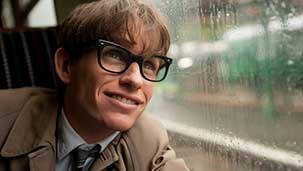Synopsizing an entire life isn’t easy. That’s why biopics tend to focus on either a definitive period (Lincoln, Walk the Line) or take the skipping-stone approach to key milestones (Mandela: Long Walk to Freedom, Ali). The right choice is always relative to the story you want to tell.
_The Theory of Everything doesn’t focus on a single period in Stephen Hawking’s life, nor does it hang a narrative on his famous scientific achievements. Rather, it tells a complicated love story that spans decades, all of which is perfectly summarized in your final sequence.
Ironically, your job was pretty straightforward. By creating a montage that reverses both the chronology and speed of the film, you had the enviable task of cherry-picking all the most touching moments. And there are plenty to choose from.
The warm, lush cinematography perfectly compliments this twirling romance, and barrels us back to a moment when everything was much simpler (in theory, anyway). We get to experience some wish fulfillment, watching Hawking’s degenerative ALS disease reverse itself until he’s spinning freely on his feet rather than in his electric wheelchair. It’s a beautiful and bittersweet ending that helps us re-experience and re-examine everything that comes before.
This includes the performances. By using a distinctly cinematic technique, my attention was temporarily fixated on the filmmaking itself. Specifically, the stand-out performance by Eddie Redmayne. He captures more emotion in a pained smile than most impressionistic biopic performances manage altogether—which is equally a compliment to the film’s script by Anthony McCarten and the direction by James Marsh.
But I don’t want to overlook what Felicity Jones brings to the role of Hawking’s wife, Jane. As far as the film is concerned, Hawking’s existence effectively begins on the night they meet. Which makes sense, considering Jane Hawking authored the book on which the film is based. But more importantly, the “Big Bang” sparks that occur that night are, in quantum terms, the singularity that brought this story into existence. But the film itself only pays passing interest to those theories; instead of chronicling Hawking’s noble pursuit for a simple equation to define the universe, The Theory of Everything looks at love as the only rational reason for being. Even if the formula can’t be proven.
But that’s how Stephen Hawking made a name for himself: by creating brilliant theories, then being their biggest critic. And looking back, love was no exception.
Sincerely,

Christopher







